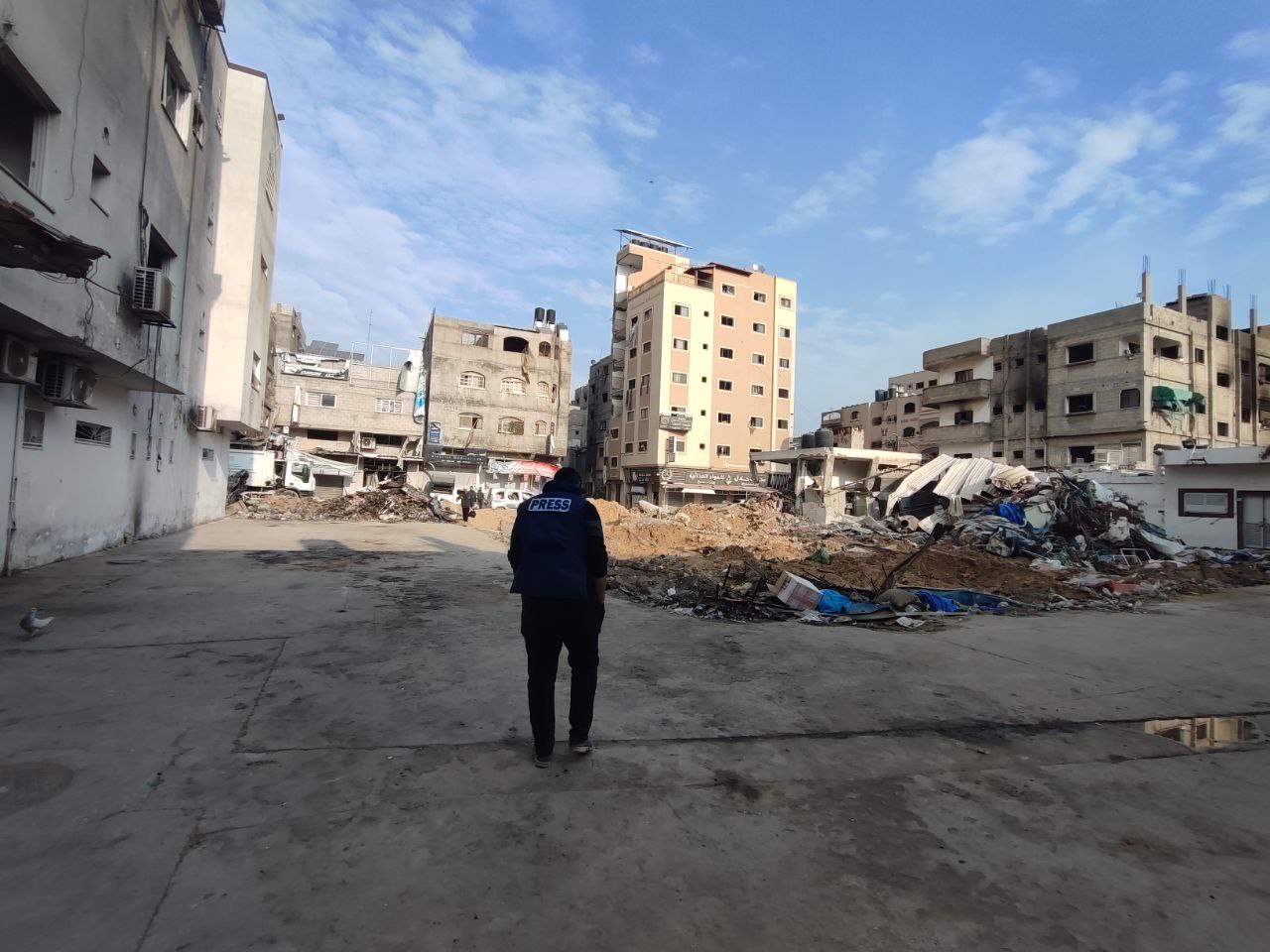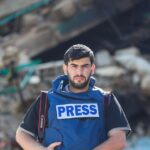
Journalist Yousef Fares stands in front of a destroyed city block in Northern Gaza on December 28, 2023. Photo: Yousef Fares Telegram.

Orinoco Tribune – News and opinion pieces about Venezuela and beyond
From Venezuela and made by Venezuelan Chavistas

Journalist Yousef Fares stands in front of a destroyed city block in Northern Gaza on December 28, 2023. Photo: Yousef Fares Telegram.
To have maggots crawling out of your body, to see a part of you rotting, and smelling the stench of it while you are still alive… such unimaginable horrors transcend even the worst nightmares. Yet, thousands of wounded people are experiencing this horror today, waiting to die, after all hospitals in the northern Gaza Strip have stopped functioning, and medical teams have stopped providing any type of medical care because they no longer have any medical supplies or methods of sterilizing wounds.
Rashid Abu Zeidan is one of these people. He received moderate wounds to his foot, eye, and face after he was hit by a rocket from a drone while he was walking home in the Beit Lahiya neighborhood. Before the Kamal Adwan Hospital was besieged by the occupation, the 30-year-old man received one initial treatment. Afterwards he was forced to leave the hospital because his condition was not critical compared to the stream of grievous cases.
He now resides at the “shelter center” outside Yemen Al-Saeed Hospital. For 20 days no one has been able to clean his wound or change the bandage, which had turned black from the dirt and filth that had stuck to it. He spoke to Al-Akhbar: “I see maggots and rotting tissue coming out of my wounds every day. I spend my days and nights drowning my screams and pain. I hide my pain so as to not disturb the people around me.”
As for the 70-year-old Hajj Abu Atta, Al-Akhbar met him wandering the streets aimlessly, asking for a doctor to treat the wound of his only son, Atta, who was injured about a month and a half ago with severe wounds in his abdomen. After his condition partially stabilized, he was miraculously discharged from the Indonesian Hospital on the eve of its siege. Since then, he has not undergone wound disinfection or further treatment. The man spoke to Al-Akhbar: “I left him at home, maggots are coming out of his stomach, and the smell of his wound is unbearable, and I promised him that I would come back to him with a doctor or nurse to clean the wound… help me.” I went to Kamal Adwan Hospital, hoping to find what he was asking for. I found what was left of the hospital completely locked up.
On the sidewalk of the new Jabalia camp market, which has turned into a cemetery containing the bodies of hundreds of martyrs, I met Abu Munir. The man told me that he realized that he was wrong when he wished for his youngest son to survive the severe injury he suffered when the occupation bombed his neighbor’s house. After 40 days, he realized that a quick martyrdom was better for him than going through a slow death. For weeks his wounds festered and maggots ate his flesh until he was finally martyred after a journey of suffering that was a thousand times harder for his family than an immediate death.
Another old man also stopped me, his tears flowing freely: “Sir, can I show you a picture I took of my wounded son two days ago?” “Of course, uncle,” I said. He replied: “It is the last thing I have left of his life. He was martyred yesterday and I buried him here in the street.”
I hugged him as if I was asking him to share with me the burden of torment on his heart, for his heart was burdened with torment that even the mountains cannot bear.
(Al-Akhbar) by Yousef Fares, with content from Yousef Fares’ official Telegram channel
Translation: Orinoco Tribune
OT/DZ/SC

Yousef Fares is a Palestinian reporter in Gaza. He is an author at Al-Akhbar News and he regularly posts updates on his telegram channel.